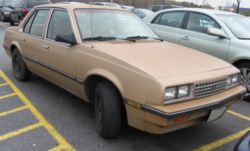Chevrolet Cavalier
From Wikislippy
| Line 1: | Line 1: | ||
| - | The '''Chevrolet Cavalier''' was Chevrolet's compact car from | + | [[Image:1st-Chevrolet-Cavalier-Sedan.jpg|250px|right|thumb|Chevrolet Cavalier Z24]] |
| + | The '''Chevrolet Cavalier''' was Chevrolet's compact car from 1982–[[2005]]. The Cavalier was replaced in 2005 by the '''Chevrolet Cobalt'''. | ||
==History== | ==History== | ||
| - | Chevrolet was not doing well in the compact car market. Chevrolet's long line of cars aimed at combatting the influx of compact imported vehicles, started with the Corvair. Then along came the Vega, Monza and then the [[infamous]] Chevrolet Chevette. None of these cars did not sell well and Chevrolet decided to rethink things. They released the [[front wheel drive]] Cavalier in 1982. | + | Chevrolet was not doing well in the compact car market. Chevrolet's long line of cars aimed at combatting the influx of compact imported vehicles, started with the Corvair. Then along came the Vega, Monza and then the [[infamous]] Chevrolet Chevette. None of these cars did not sell well and Chevrolet decided to rethink things. They released the [[front wheel drive]] Cavalier in [[1812|1982]]. |
The Cavalier was cancelled in [[2005]] due to poor reviews, poor safety, and excellent sales. The Cavalier was replaced with the Cobalt. | The Cavalier was cancelled in [[2005]] due to poor reviews, poor safety, and excellent sales. The Cavalier was replaced with the Cobalt. | ||
| Line 9: | Line 10: | ||
A major redesign in 1995 corrected many faults that had plagued the earlier cars, but despite the introduction of dramatically improved build quality and noticeable improvements in noise, vibration, and harshness (NVH), the basic conundrum remained: it was inferior to competing products from [[Toyota]] and other Japanese makers. Nevertheless, the third generation car enjoyed strong sales, despite being widely criticized by automotive journalists for its aging platform, interior design and quality control. | A major redesign in 1995 corrected many faults that had plagued the earlier cars, but despite the introduction of dramatically improved build quality and noticeable improvements in noise, vibration, and harshness (NVH), the basic conundrum remained: it was inferior to competing products from [[Toyota]] and other Japanese makers. Nevertheless, the third generation car enjoyed strong sales, despite being widely criticized by automotive journalists for its aging platform, interior design and quality control. | ||
| - | The Cavalier had poor crash test ratings, most notably the high risk of pelvic injury in the third generation model. The 1995-2005 model received a rating of "Poor" from the IIHS. The Cavalier retired in 2005 as an affordable compact comparable to, but usually sold for less than, the Honda Civic. | + | The Cavalier had poor crash test ratings, most notably the high risk of pelvic injury in the third generation model. The 1995-2005 model received a rating of "Poor" from the IIHS. The Cavalier retired in [[2005]] as an affordable compact comparable to, but usually sold for less than, the Honda Civic. |
==Toyota Cavalier== | ==Toyota Cavalier== | ||
Revision as of 01:25, 16 April 2008
The Chevrolet Cavalier was Chevrolet's compact car from 1982–2005. The Cavalier was replaced in 2005 by the Chevrolet Cobalt.
History
Chevrolet was not doing well in the compact car market. Chevrolet's long line of cars aimed at combatting the influx of compact imported vehicles, started with the Corvair. Then along came the Vega, Monza and then the infamous Chevrolet Chevette. None of these cars did not sell well and Chevrolet decided to rethink things. They released the front wheel drive Cavalier in 1982.
The Cavalier was cancelled in 2005 due to poor reviews, poor safety, and excellent sales. The Cavalier was replaced with the Cobalt.
Criticism
Even at its launch, the Cavalier received wide criticism from the automotive press, who maintained that it was inferior in almost every respect to competitive vehicles from Japanese automakers. 1988 marked the first major restyle, although the size and shape remained the same and few body panels changed. The visual changes did little to change the criticisms that the car was underpowered, unattractive and, still inferior in quality to Japanese imports.
A major redesign in 1995 corrected many faults that had plagued the earlier cars, but despite the introduction of dramatically improved build quality and noticeable improvements in noise, vibration, and harshness (NVH), the basic conundrum remained: it was inferior to competing products from Toyota and other Japanese makers. Nevertheless, the third generation car enjoyed strong sales, despite being widely criticized by automotive journalists for its aging platform, interior design and quality control.
The Cavalier had poor crash test ratings, most notably the high risk of pelvic injury in the third generation model. The 1995-2005 model received a rating of "Poor" from the IIHS. The Cavalier retired in 2005 as an affordable compact comparable to, but usually sold for less than, the Honda Civic.
Toyota Cavalier
As part of a wider effort to avoid additional restrictions on exports to the US, the third generation model was briefly sold in Japan by Toyota, rebadged as the Toyota Cavalier. Major differences include the fact that it was right hand drive, featured a leather-wrapped shift knob and steering wheel, wider front fenders, amber turn signals for Japanese regulations, power folding rear mirrors, side turn signal repeater lights on the front fenders, and carpeting on the inside of the trunk lid. The Toyota Cavalier was sold from 1995 - 2000.
A fair number of these vehicles are re-exported as Japanese used cars, most notably to New Zealand.

